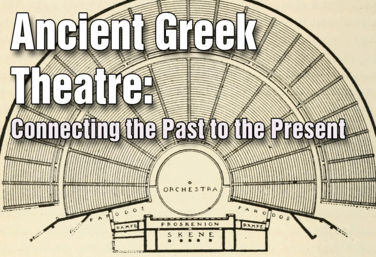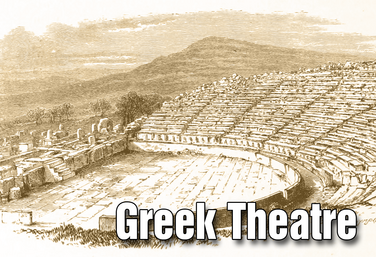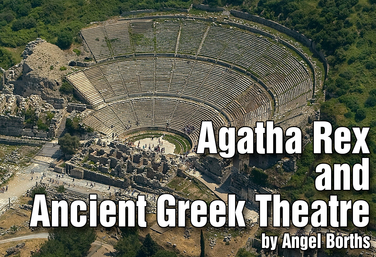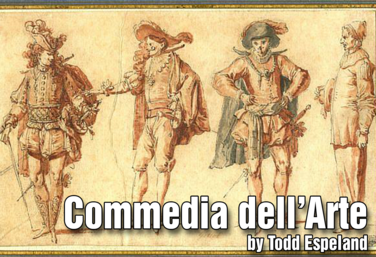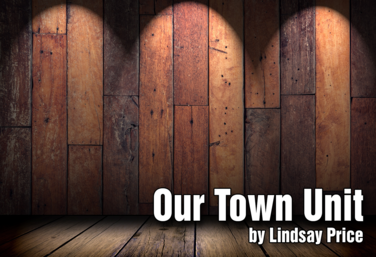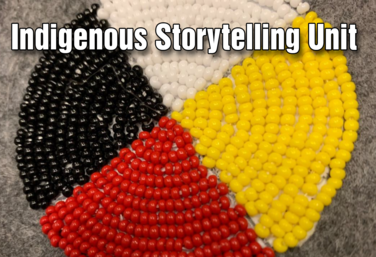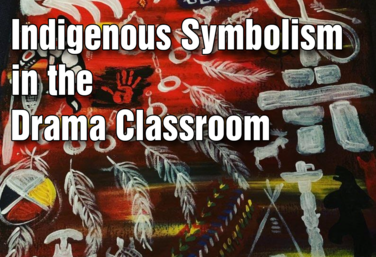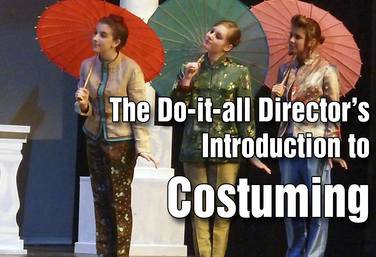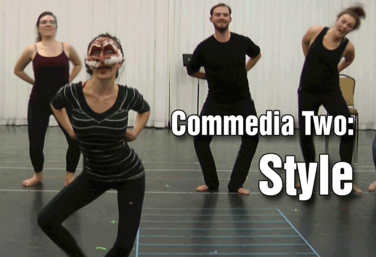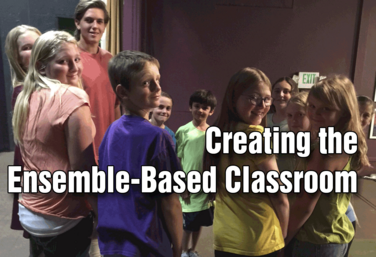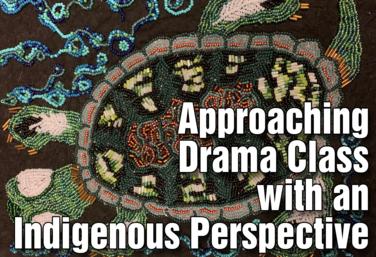Colorado Academic Standards - Drama and Theatre Arts
High School - Advanced Pathway
View all Standards for Colorado Academic Standards - Drama and Theatre Arts
DT.H2.1.2.b Students Can: Cooperate as a creative team to make interpretive choices for a drama/theatre work.
Ancient Greek Theatre
by Lindsay Price
In studying Ancient Greece, we’re looking at the foundations of theatre as we know it today. Without the Ancient Greek Era, we do not get actors, theatres, plays, and the definitions of tragedy and comedy.
The issue with studying theatre history, or anything historical is that it can become an exercise in memorizing dates and reciting facts. When the truth of the matter is no one in the 21st century benefits from learning by rote. This is especially true when studying history in the framework of a drama classroom. We need exercises that bring history to life, instead of having students plot dates on a timeline.
To that end, this unit does not focus on dates and data. The essential question for the unit is how can we connect the past to the present and this question is explored through the theatricalization of information. Students will access all four 21st century skills, critical thinking, creative thinking, collaboration and communication as they explore this amazing world.
Reflections, exit slips, and rubrics are included throughout the unit as well as a mid assignment evaluation for the culminating project.
Read More...
Read Less...
Part of the Drama One Curriculum
Ancient Greek Theatre
by Karen Loftus
This unit on Ancient Greek theatre focuses on the function of the chorus, the choral ode, and the details of the theatre space. It touches on plays and playwrights of the era, culminating in a final project of a modern version of Medea that includes a choral ode.
Read More...
Read Less...
Agatha Rex and Ancient Greek Theatre
by Angel Borths
Help…It’s all Greek to me! Join Angel Borths in this unit that uses a modern adaptation of the Ancient Greek play Antigone to introduce Middle School students to Ancient Greek Theatre.
Have your students read Percy Jackson and want to find out more about Ancient Greece? Then, this unit is for you. This unit is designed for middle and high school students and will take you through the basics of classical Greek theatre and pairs it with a modern adaptation of the story of Antigone called Agatha Rex by Lindsay Price. Students will learn vocabulary, design, and basic theory surrounding classical Greek theatre. Students will also enjoy the mask building component of this unit, as they learn to disappear into the character of a mask, like the first actors did on a Greek stage thousands of years ago.
The unit culminates in a scene performance with masks.
Read More...
Read Less...
Commedia dell'Arte
by Todd Espeland
Commedia dell’arte is a 16th century masked acting form. It is the basis of all comedy, including all tv sitcoms. This form is characterized by masked types and archetypical characters and a specific way of playing comedy. To that end, this unit is divided into two parts.
Part One focuses on the foundations of commedia - playing comedy. These principles will be important to learn when it comes to developing commedia characters, specifically the physicality of the characters. Part Two will cover lazzi.
Note: there are links to video demos in many of the lessons of this unit.
Read More...
Read Less...
Our Town Unit
by Lindsay Price
This is a read, discuss, and apply literature unit. Students will study the play Our Town by Thornton Wilder.
Our Town is often referred to as “nostalgic.” It’s seen as an antiquated look at a moment in time. But this play is called Our Town, not My Town. What’s happening in Grover’s Corners happened in the past, the distant past, in our present, and even in the future. The themes of the play—the ordinary versus universality, the concept of time, the cycle of life, the ignorance of humanity to the eternal—these are just as relevant in the twenty-first century as they were when the play was written.
The purpose of the unit is not to have students recall knowledge about the play. Students will be able to identify, articulate, and dramatize text themes and concepts and compare/contrast these concepts to their own experiences.
Read More...
Read Less...
Indigenous Storytelling Unit
by Allison Green
This Indigenous Storytelling unit is brought to you in a different format than a traditional lesson plan. It uses a learning circle format. It was developed by Allison Green, a member of the Algonquin Band of Mattawa Ontario, who is also the author and instructor of the DTA course Approaching Drama Class with an Indigenous Perspective.
Students will discuss origin stories, research the background and land connection of a variety of Indigenous creation stories, create a plot graph of their story, share with the class what they have learned, and then retell the story in their own words. Once students have practiced this process, they will repeat the steps with an Abenaki creation story: Research | Recreate | Understand.
Read More...
Read Less...
Perspective Taking
by Lindsay Price
Perspective taking is the ability to understand a situation from another person’s perspective or point of view: What are they thinking? What are they feeling? How does their background influence their perspective? Perspective taking allows students to develop self-awareness, to recognize differences, to understand an opposing point of view, to assess nonverbal language, and more.
In this unit, students will practice perspective taking as they:
• Assess their own perspective.
• Demonstrate understanding of the perspective of others in specific situations.
• Analyze characters in a text.
Read More...
Read Less...
Theatre Radically Reimagined: Exploring Artaud, Grotowski, and Boal
by Ruthie Tutterow
In this unit, students will learn about Antonin Artaud and how his ideas influenced avant-garde theatre in the 20th and 21st centuries. They will also learn how Jerzy Grotowski took Artaud’s theories into new directions. This is done through direct instruction. A culminating presentation will ask students to take common stories and reimagine them using some of these ideas. They will present a “pitch” of an avant-garde version of their story. In the second lesson, students learn about some of the ideas of Augusto Boal and try a session of Forum Theatre.
Read More...
Read Less...
Character Development with an Indigenous Perspective
by Allison Green
Students will develop characters based on the character traits of the Seven Grandfather Teachings. The unit begins with a focus on the traits (Love, Wisdom, Respect, Bravery, Honesty, Humility, and Truth) and the story of elders passing on teachings to the youth. Students will use tableau, viewpoints, and movement and explore how to develop a character with a clear backstory and identity. The unit uses open, neutral scenes as a partnered task that students can use to apply their learning followed by reflection and class discussion.
Read More...
Read Less...
Indigenous Symbolism in the Drama Classroom
by Allison Green
The objective of this unit is for students to be able to engage with Indigenous symbolism in art, and then interpret it in a theatrical context. It begins with an introduction of symbolism through a retelling of an Indigenous story with wolves representing human traits. Students develop a scene that focuses on how to “show and tell” an Indigenous story, clearly showing the symbolic meaning from the oral story. Students will then explore symbols by looking at the characteristics of Canadian Indigenous Art, delving into the symbols and story. Students then share their interpretation of the art by creating and presenting a piece of theatre, followed by reflection and class discussion.
Read More...
Read Less...
Tech Theatre Unit: Costuming When You Don't Sew
by Drama Teacher Academy
In this unit, students will take on the role of the costumer, which is different from a costume designer. It introduces costuming concepts in order to execute a costume. No complicated sewing is required, which is great if you don’t have the background, the access, or the resources to have a class of students create costumes.
Instead of making costumes from scratch, as a designer would, students will create costumes from stock, borrowed items, or low-cost finds. They will take finished products and adapt them into what they need to create the right atmosphere.
In order to help with their adaptations, students will try different distressing techniques and learn three SIMPLE stitches that they’ll be able to use over and over again. It’s a valuable tech theatre skill to teach students how to execute on costumes when you (and they) don’t sew!
Read More...
Read Less...
The Do-it-All Director's Introduction to Costuming
by Holly Beardsley
Do you know the difference between a bustle and a buckram frame? Or what works best as an emergency hem? Some directors are blessed with a big budget and a full support staff—a choreographer, a set designer, and a costumer. But the drama teacher often becomes director, choreographer, set designer, and costumer all in one.
And a budget? What’s a budget? The Do-It-All Director’s Introduction to Costuming will give you, the director, who must do it all, the confidence and skills to costume and direct, no matter your experience or budget. This course will teach you costuming basics, budget tricks, organization, and most importantly, the art of costuming as a director.
Read More...
Read Less...
Commedia II: Style
by Todd Espeland
Commedia dell’arte is a 16th Century masked acting form. It’s the basis of all comedy and it’s a form that many teachers want to include in their curriculum.
Instructor Todd Espeland has designed two courses that work hand-in-hand with teaching this fantastic physical form.
In Commedia II: Style - Todd moves on to the specific style of Commedia dell’arte. This includes a history of commedia, the stock characters and how to physicalize them, sample lazzi and a capstone assignment. The course includes video demonstrations so you can see the exercises and activities in action.
Read More...
Read Less...
Creating the Ensemble-Based Classroom
by Gai Jones
Gai Jones will help you establish an ensemble-based environment from the first day of class or rehearsal.
Learn how to set up your ensemble-based classroom from day one, get students to set classroom norms, and find the balance between creative activity and structure. You’ll learn how to give your students creative freedom through structure and classroom management. The cornerstone of this course are the detailed ensemble experiences from large group to small group and even individual experiences.
This course culminates in a devising model that you can use with your students, and takes you through process, product, performance and an evaluation.
You too can create the ensemble-based classroom.
Read More...
Read Less...
21st Century Skills Through Devising
by Allison Williams
Allison Williams leads the course: 21st Century Skills Through Devising. This course covers what devising is, why to do it, how to do it, and how your students can master the 21st Century Skills of collaborations and cooperation, critical thinking, creative thinking through devising.
High school is a great place to try devising with your students. But it’s not something you want to throw at your students without any preparation. Framework is important and this course takes you through a number of exercises you can take into the classroom tomorrow to help build a place of physical safety, a place where students work at making a lot of choices instead of waiting for the perfect choice, and a place where students feel comfortable making creative choices. The material also reviews the process of putting together a show from the idea/research stage to editing, to giving feedback.
Your students have what it takes to create their own material, collaborate with each other, and have a unique theatrical experience!
Read More...
Read Less...
Approaching Drama Class with an Indigenous Perspective
by Allison Green
This course is led by Allison Green, a member of the Algonquin Band of Mattawa, and a drama and social sciences teacher in Northern Ontario, Canada. She believes that drama teachers should look at their teaching through an Indigenous lens for a few reasons:
- It is time in North America to take a conscientious look at Indigenous people’s approach to learning and teaching.
- For our Indigenous students, it’s important to see themselves in materials, activities, and classroom routines.
- It is also valuable for our non-Indigenous students to see and better understand the diverse nature of the creative process and ways of seeing our world through this lens.
This course aims to help teachers see their drama class through an Indigenous lens - by exploring the learning circle, culturally responsive approaches, and Indigenous pedagogy.
Read More...
Read Less...
View all Standards for Colorado Academic Standards - Drama and Theatre Arts Standards Master List
© Copyright 2015-2025 Theatrefolk
